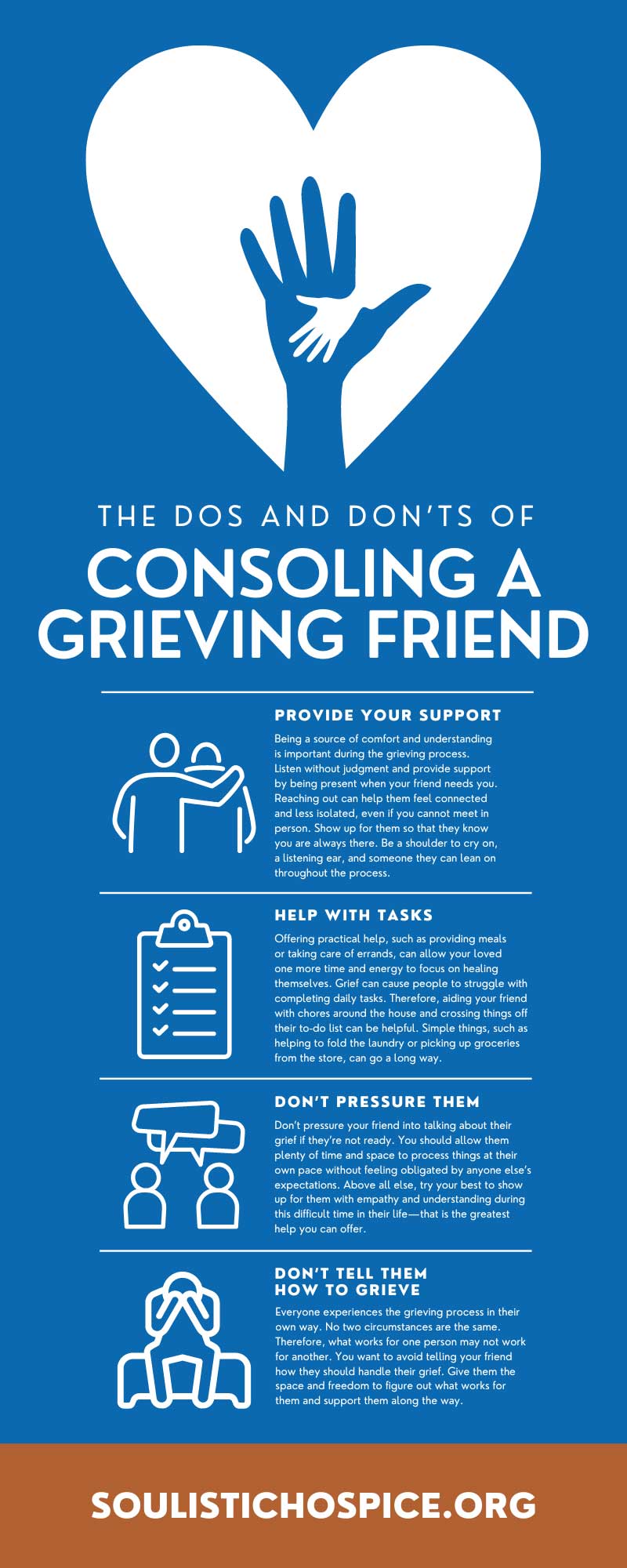
Grief is a complex emotional process that often feels impossible to understand. Everyone experiences grief differently, and it’s important to remember that everyone needs time, space, and understanding during this difficult period. Grieving individuals may sometimes feel overwhelmed with sadness, guilt, anxiety, or anger. However, these emotions are all part of an essential healing process. If you have a friend or loved one experiencing grief, it’s important to be there for them. It can be challenging at times to know the right things to do during this time. But with the right tips, you can offer them the support they need. Learn more in this guide to the dos and don’ts of consoling a grieving friend.
What To Do
Perhaps this is your first time consoling someone during the grieving process. In that case, you are likely overwhelmed and confused about where to begin—and that’s totally normal. While there’s not necessarily a right or wrong way to support someone, there are tactics that work better than others. Continue reading to find ways to show up for your friend during this time.
Provide Your Support
Being a source of comfort and understanding is important during the grieving process. Listen without judgment and provide support by being present when your friend needs you. Reaching out can help them feel connected and less isolated, even if you cannot meet in person. Show up for them so that they know you are always there. Be a shoulder to cry on, a listening ear, and someone they can lean on throughout the process.
Help With Tasks
Offering practical help, such as providing meals or taking care of errands, can allow your loved one more time and energy to focus on healing themselves. Grief can cause people to struggle with completing daily tasks. Therefore, aiding your friend with chores around the house and crossing things off their to-do list can be helpful. Simple things, such as helping to fold the laundry or picking up groceries from the store, can go a long way.
Respect Their Boundaries
It is important to remember that everyone grieves differently and in their own time, so it’s essential not to pressure someone into healing faster than they are ready. If your friend is not ready to talk about their feelings, that’s OK. It’s essential that you respect their boundaries and give them the time to process everything. You can ask them if they want to talk about anything; if they say no, you need to respect that decision.
Encourage Healthy Coping Mechanisms
Healthy coping mechanisms are essential during the healing journey. And you can help your friend process their emotions and take their mind off of things by engaging in hobbies and activities they enjoy. Invite them out for lunch or coffee, or spend some quality time with them doing something that doesn’t involve talking about the loss. You can have a movie night, go for a hike, take a road trip, play a sport, or spend the day shopping. Having moments of joy among the sadness will help put things in perspective and remind both of you how much there still is to appreciate in life.
Share Happy Memories
Another way of helping someone grieving is by finding ways to keep memories alive. This process could include creating scrapbooks with photographs or writing letters expressing thoughts and feelings about the person who has passed away. Share happy memories about the passed loved one and tell stories that make you happy and remind you of all the good times from their life. But remember that your friend may not be ready for this immediately, so you should allow them to lead the conversation.
Help Them Find Resources
At times, it’s important to recognize when your friend may need more support than you can offer. In these cases, you should encourage your friend to seek support from other sources, such as professional counseling or bereavement support groups. You can offer your assistance when looking for these types of services to remind your friend that they don’t have to face this process alone.
What Not To Do
Now that we’ve gone over the helpful support tactics to use, we must assess which strategies to avoid. Again, there is no right or wrong way to help someone. However, certain techniques can be less beneficial for someone during the grieving process. These methods are not worth applying because they can contribute to further emotional stress or turmoil.
Don’t Pressure Them
Don’t pressure your friend into talking about their grief if they’re not ready. You should allow them plenty of time and space to process things at their own pace without feeling obligated by anyone else’s expectations. Above all else, try your best to show up for them with empathy and understanding during this difficult time in their life—that is the greatest help you can offer.
Avoid Trying To “Fix” Things
Avoid attempting to “fix” the problem or provide solutions, as this will only make your friend feel more isolated and helpless. Many people mistakenly try to fix and make light of the situation using “at least” statements such as “At least you still have your other children/partner/parent,” which can come across as insensitive and dismissive of their feelings. Therefore, you should avoid these tactics. You should also refrain from comparing the individual’s experience with another person’s. Everyone grieves differently, and while comparisons may seem like a form of consolation, they often lead to further feelings of guilt and frustration.
Don’t Tell Them How To Grieve
Everyone experiences the grieving process in their own way. No two circumstances are the same. Therefore, what works for one person may not work for another. You want to avoid telling your friend how they should handle their grief. Give them the space and freedom to figure out what works for them and support them along the way.
Now that you have a guide on the dos and don’ts of supporting a grieving friend, you can use these strategies to help your loved one. Soulistic Hospice provides grief support groups in Tucson, AZ, if you or a loved one need more support during the grieving process.









